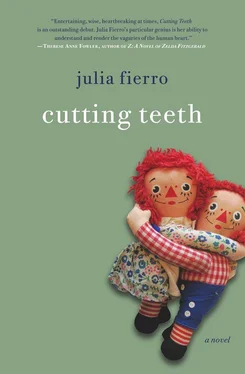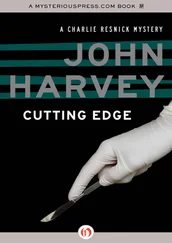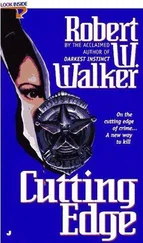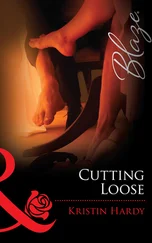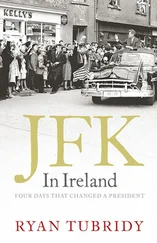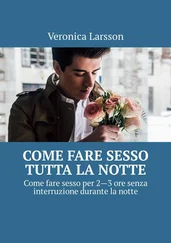“A girl?” Hank sang, smiling and shaking his head as if he was in on the joke. “Dad’s not a girl.”
“Michael’s just being silly,” Rip said, when what he wanted to say was Michael’s just being an asshole.
“Girls are cool,” Harper said.
“They sure are, sweetie,” Michael said. “And boys and girls can be friends.”
“You are my friend, Hah-per,” Hank said quietly.
“And Mommy Tiffany and Daddy Rip are friends,” Michael said. “Isn’t that right, Daddy Rip?”
“Sure we are,” Rip said, unnerved. “Our whole playgroup is pretty tight.”
Michael didn’t answer. Rip listened to the sound of the paddles cutting through the water and worried: what was Michael implying? Could Tiffany have told him something, about what happened in the kitchen yesterday? Rip’s interaction with her had been limited all day, but it seemed normal enough. As if they’d simply go on with the monotony of little kid life — naps and snacks and trips to the potty — as if nothing had happened. Sure, Tiffany was wild and loved to see how far she could push boundaries, but would she really tell her fiancé about what had happened in the kitchen? Or what had almost happened, Rip corrected, because nothing had happened, had it? Okay, something had happened, he thought. A line had been crossed. Their bodies had reached for each other, and he knew she’d been as wet as he’d been hard, and he was growing hard in the canoe now just thinking about how nothing had happened, goddamnit. Especially, he told himself (convinced himself, by squeezing his thighs together and pushing his weight into the paddling), when you thought about what could have happened.
In the twenty minutes it took to round the tip of the island, while Rip tried not to think about Tiffany and her breasts and the slight looseness in her bikini bottom where he had, earlier that day, on the deck while she lay on the lounger, glimpsed something inside, the children talked nonstop. They pointed out a school of silvery fish leaping into the air as the canoe glided past. They spotted an orange-and-black butterfly flitting over the dark blue water.
“Wow, a monarch!” Hank whispered with awe. “What if he falls in, Daddy?”
“He’ll be okay,” Rip said with a grunt. It was hard to talk and paddle at the same time without losing his breath. The wind had picked up, just enough to ruffle Hank’s hair a bit, but it felt as if they were pushing against a wall of water. Were they paddling against the current or what? Not like he would ask Michael and risk looking like a wuss.
“Man, that kid’s smart,” Michael said. “He’ll be like a science teacher. Or some kind of tech geek who invents something and makes a billion.”
Rip couldn’t help but feel it was a backhanded compliment. He knew all the hipsters were using the term geek like it was cool, but hadn’t those same hipsters just been geeks themselves back in the day, bullied and persecuted? Plus, it was killing him, the way Michael spoke, almost breezily, as if paddling were a piece of cake. Rip knew what the guys in their weight-lifting belts at Shitty Gym would think of him now, winded by a damn paddle.
The trip was anything but peaceful, despite the gorgeous orange orb of the sun sinking into the horizon, and the clouds that hung low and pink, as if dazed by the sun’s beauteous exit. But the children talked incessantly. A bird! Look, a doggie on the beach! Are we almost there? When will we be there? Another bird! That’s onetwothreefourfive birds .
“Hank. Harper,” Rip said finally. “Let’s have a little quiet time, okay?”
“They’re just being kids,” Michael said with a shrug.
“Sorry,” Rip said, embarrassed he’d let himself come close to losing it, a term he’d used himself to criticize so many parents on the playgrounds of Brooklyn, mocking them for succumbing to the strain of wrangling a child under five. What was wrong with him?
By the time they made it to the marshy estuary — really just a pond with a narrow link to the Sound — the sun had lost its fire. Under the canopy of the weeping willows that draped the pond’s shore, it felt as if night was much closer than he’d thought. What a relief it was to drop the paddle and massage his throbbing arms. The boat turned in a circle. So slowly, he didn’t realize the rotation until they were facing a different part of the woods ringing the pond. The air smelled damp and mossy, like the inside of a mushroom. Every minute or so, he had to swipe at a mosquito, bat it away from Hank, whose plump brown skin was a delicacy for the bloodsuckers.
Instead of satisfying the children, the end of the journey sparked a new host of questions. Why are we stopping? What is this place? Where are the swans? You said there’d be swans. Where are the swan babies? Are there going to be swans, Daddy? Are we going back soon?
Rip and Michael shushed them gently, reassured them again and again. They lied the harmless white lies of parenthood, like the swans are napping and maybe the swans are still on their summer vacations, which birthed even more questions like, Why do swans have to take naps? Where do swans go on vacation?
Rip came up with a game. Count the trees. Count the different sounds of the birds. And when that was finished, count slowly all the way up to a hundred!
“Anything can be a game,” he said, and winked at Michael, feeling like a parenting expert, “if you make it sound exciting.”
This gave the two men a window of conversation. Michael turned to face him. The breeze had picked up, and the canoe was turning faster, and it felt disorienting as Rip thought, frantically, about what they should talk about. Time was ticking away. Soon the children would be bothering them again, destroying any chance there was to have a coherent — and just maybe — meaningful conversation. So he brought up an earlier topic, the one on which he and Michael had bonded the day before in their initial (and successful, he thought) tête-à-tête; what they hated about the playgrounds of brownstone Brooklyn.
“So,” Rip said, cringing at how much he sounded like a gossip-hungry mommy, “what’s the worst parenting you’ve seen at the playground in our ’hood?”
Michael guffawed, and it sent a cluster of birds shooting through the branches into the small patch of open sky above their heads.
Harper and Hank paused their counting and looked up, their lips parted in surprise.
“I saw some mom at Cobble Hill Park the other day,” Michael started.
“Oh yeah,” Rip interrupted. “I know where this is going. That’s the swanky part of the neighborhood over there.”
As if, Rip thought, Grace didn’t make close to three hundred thou a year. As if they didn’t own a three-bedroom apartment, renovated to boot.
Harper renewed her counting, “Thirteen, fourteen.”
Hank joined in and the children chanted in unison, “fifteen, sixteen, seventeen…”
Michael continued, “This mom, at the park, she gave her daughter — a quiet little thing — a time-out for walking up the slide!” He huffed in disbelief.
Together, the two dads shook their heads.
“No way,” Rip said.
“I mean, look,” Michael leaned over Harper so his face was just a few inches from Rip’s. His skin was a blueish gray in the fading light. Like he was telling a ghost story, Rip thought, and he felt the sudden chill on his bare arms. “I don’t let Harper climb up the slide if there’s a kid waiting to come down. But there was nobody up there. It was just plain gross.”
Rip wished the way he talked was more like Michael’s; thoughtful, unhurried, like he had all the time in the world. Rip had always disliked his quirk of spewing forth anxiously. His jokes falling flat, so that sarcasm was taken seriously, missteps that pushed people away. All because he couldn’t just slow the fuck down and because, he thought now, he was worried no one would listen for very long. It had been an issue in his college acting classes, his habit of delivering his lines too fast.
Читать дальше
